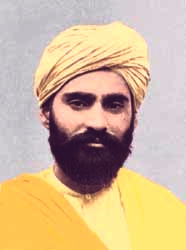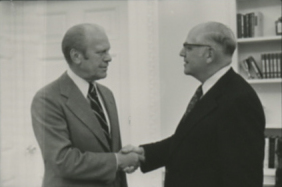A Quote by St. Vincent
However great the work that God may achieve by an individual, he must not indulge in self-satisfaction. He ought rather to be all the more humbled, seeing himself merely as a tool which God has made use of.
Related Quotes
When we try to imagine what God is like we must of necessity use that-which-is-not- God as the raw material for our minds to work on; hence whatever we visualize God to be, He is not, for we have constructed our image out of that which He has made and what He has made is not God. If we insist upon trying to imagine Him, we end with an idol, made not with hands but with thoughts; and an idol of the mind is as offensive to God as an idol of the hand.
So long as we judge ourselves by human comparisons, there is plenty of room for self-satisfaction, and self-satisfaction kills faith, for faith is born of the sense of need. But when we compare ourselves with Jesus Christ, and through Him, with God, we are humbled to the dust, and then faith is born, for there is nothing left to do but to trust to the mercy of God.
Just supposing for the sake of the argument that there is a being of such a kind as that He may with any propriety be called "God", it does seem antecedently very improbable that weak and limited creatures of a day, such as we are, should discover Him by our own efforts.... who could be discovered in that way would hardly be worth discovering. I think we ought to stick to that principle rather firmly. I think we ought to be rather sure that we cannot know God unless God has been pleased to reveal Himself to us.
As long as a man is persuaded that he can make even the smallest contribution to his salvation, he remains self-confident and does not utterly despair of himself, and so is not humbled before God. Such a man plans out for himself a position, an occasion, a work, which shall bring him final salvation, but which will not.
Perhaps the greatest barrier to revival on a large scale is the fact that we are to interested in a great display. We want an exhibition; God is looking for a man who will throw himself entirely on God. Whenever self-effort, self-glory, self-seeking or self-promotion enters into the work of revival, then God leaves us to ourselves.
When we believe that we ought to be satisfied, rather than God glorified, we set God below ourselves, imagine that He should submit His own honor to our advantage; we make ourselves more glorious than God, as though we were not made for Him, but He made for us; this is to have a very low esteem of the majesty of God.
Never trample on any soul though it may be lying in the veriest mire; for that last spark of self-respect is its only hope, its only chance; the last seed of a new and better life: the voice of God that whispers to it: "You are not what you ought to be, and you are not what you can be. You are still God's child, still an immortal soul. You may rise yet. and fight a good fight yet, and be a man once more, after the likeness of God who made you, and Christ who died for you!
The soul of the just man is but a paradise, in which, God tells us, He takes His delight. What do you imagine, must that dwelling be in which a King so mighty, so wise, and so pure, containing in Himself all good, can delight to rest? Nothing can be compared to the great beauty and capabilities of a soul; however keen our intellects may be, they are as unable to comprehend them as to comprehend God, for, as He told us, He created us in his own image and likeness.
Philosophers have long conceded, however, that every man has two educators: 'that which is given to him, and the other that which he gives himself. Of the two kinds the latter is by far the more desirable. Indeed all that is most worthy in man he must work out and conquer for himself. It is that which constitutes our real and best nourishment. What we are merely taught seldom nourishes the mind like that which we teach ourselves.
I want to remind priests that the confessional must not be a torture chamber but rather an encounter with the Lord’s mercy which spurs us on to do our best. A small step, in the midst of great human limitations, can be more pleasing to God than a life which appears outwardly in order but moves through the day without confronting great difficulties. Everyone needs to be touched by the comfort and attraction of God’s saving love, which is mysteriously at work in each person, above and beyond their faults and failings.
God must have been engaged from the beginning, and must now be engaged in progressive development, and infinite as God is, he must have been less powerful in the past than he is today.... We may be certain that, through self-effort, the inherent and innate powers of God have been developed to a God-like degree. Thus he has become God.
The ultimate difference between God's wisdom and man's wisdom is how they relate to the glory of God's grace in Christ crucified. God's wisdom makes the glory of God's grace our supreme treasure. But man's wisdom delights in seeing himself as resourceful, self-sufficient, self determining, and not utterly dependent on God's free grace.




































